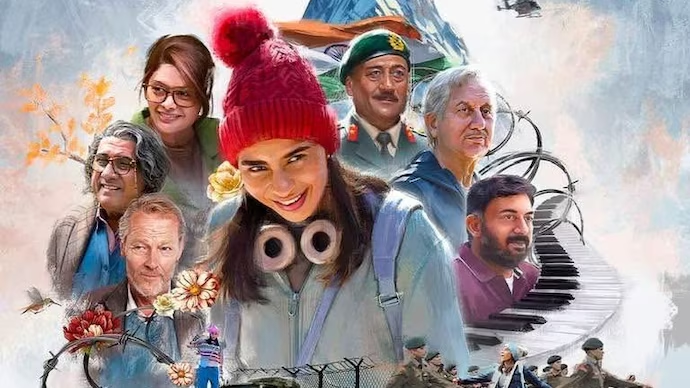
Introduction
“Tanvi The Great,” directed by the legendary Anupam Kher, is a heartfelt drama that weaves together themes of family, resilience, and purpose with artistic ambition and a touch of fantasy. The film follows a determined autistic girl as she sets out to fulfill her late father’s dream—a promise fraught with obstacles, hope, and cinematic excess. The movie stands out for its heartfelt performances, especially by newcomer Shubhangi Dutt and Anupam Kher himself, but not without narrative bumps along the way.
Story and Structure
The narrative foundation of “Tanvi The Great” borrows its structure from films like “My Name is Khan”—placing an autistic protagonist (Tanvi) at the center of an inspirational journey. But, unlike similar films, Tanvi is never truly alone: flanked at every step by her wise and weathered grandfather, Colonel Pratap Rea (Anupam Kher), and her nurturing mother, Vidya (Pallavi Joshi). A ghostly absence haunts Tanvi—a father (Karan Tacker) who died while serving in the army, leaving behind unfinished dreams that Tanvi strives, bravely, to complete.
The first half immerses the viewer in a world where hope can move mountains. Director Anupam Kher—returning behind the camera after 23 years—crafts a patient, emotional build, allowing smaller, everyday exchanges to create genuine poignancy. The film’s backdrop—framed by the serene beauty of Lansdowne—adds a layer of visual poetry, inviting audiences to discover the region’s quiet charm.
Performances and Characters
- Shubhangi Dutt debuts as Tanvi, successfully capturing the vulnerability and determination of her character for much of the narrative. The portrayal is mostly consistent, drawing the audience into Tanvi’s personal world and struggle.
- Anupam Kher impresses as both director and actor. His Colonel Pratap reveals frustration and buried grief with remarkable subtlety.
- Pallavi Joshi delivers a reliable, emotionally rich turn as Vidya, Tanvi’s mother and an expert on autism—her presence grounding the film’s family dynamic.
- Supporting cast includes Jackie Shroff as the suave Brigadier Joshi, who nearly steals scenes with his magnetic presence, and Boman Irani as the music teacher Raza Sahab, though his character feels underdeveloped.
- Ian Glenn from Hollywood appears in a brief but notable role that adds international appeal.
Emotional Core & Visual Appeal
The emotional heart of the movie beats strongest in “the everyday moments”—small gestures and conversations that make Tanvi’s world feel real. The message is clear: hope, even the quiet kind, can transform lives. The production highlights Lansdowne’s airy hills and peaceful surroundings, which are as much a part of the story as the characters themselves.
Weaknesses and Narrative Choices
Despite a compelling start, “Tanvi The Great” struggles in the second half. The plot escalates rapidly, layering twists atop one another until credibility becomes strained. As the story veers into the realm of pure fantasy, the grounding established early on starts to erode. Some scenes become logic-defying, pushing the film past the boundaries of plausibility—even for escapist cinema.
A major criticism is the way Tanvi’s behavior shifts: in the second act, her autism seems almost forgotten, diluting the initial authenticity and undermining the emotional impact.
The film begins with a disclaimer: its portrayal of autism is an artistic interpretation rather than a clinical or scientific one. While creativity in storytelling is welcome, this disclaimer may not excuse inconsistencies in Tanvi’s characterization.
Music and Technicals
- Music by M.M. Keeravani strikes a pleasing, if unremarkable, note. The real standout is Kausar Munir’s lyrics, which elevate the soundtrack above the ordinary.
- Cinematography and production design add to the film’s immersive, inviting tone—particularly in the first half.
Final Verdict
“Tanvi The Great” is a movie constructed with good intentions, powerful performances, and an earnest emotional core. Its ambitious storytelling and uplifting message about perseverance ensure that Tanvi’s quiet courage lingers, even as the plot loses grip in its later chapters.
Though marred by an uneven arc and a loss of realism in the climax, the film is worth watching for its themes of hope and family, as well as for Shubhangi Dutt’s memorable debut and Anupam Kher’s assured direction.
Rating: 3 stars